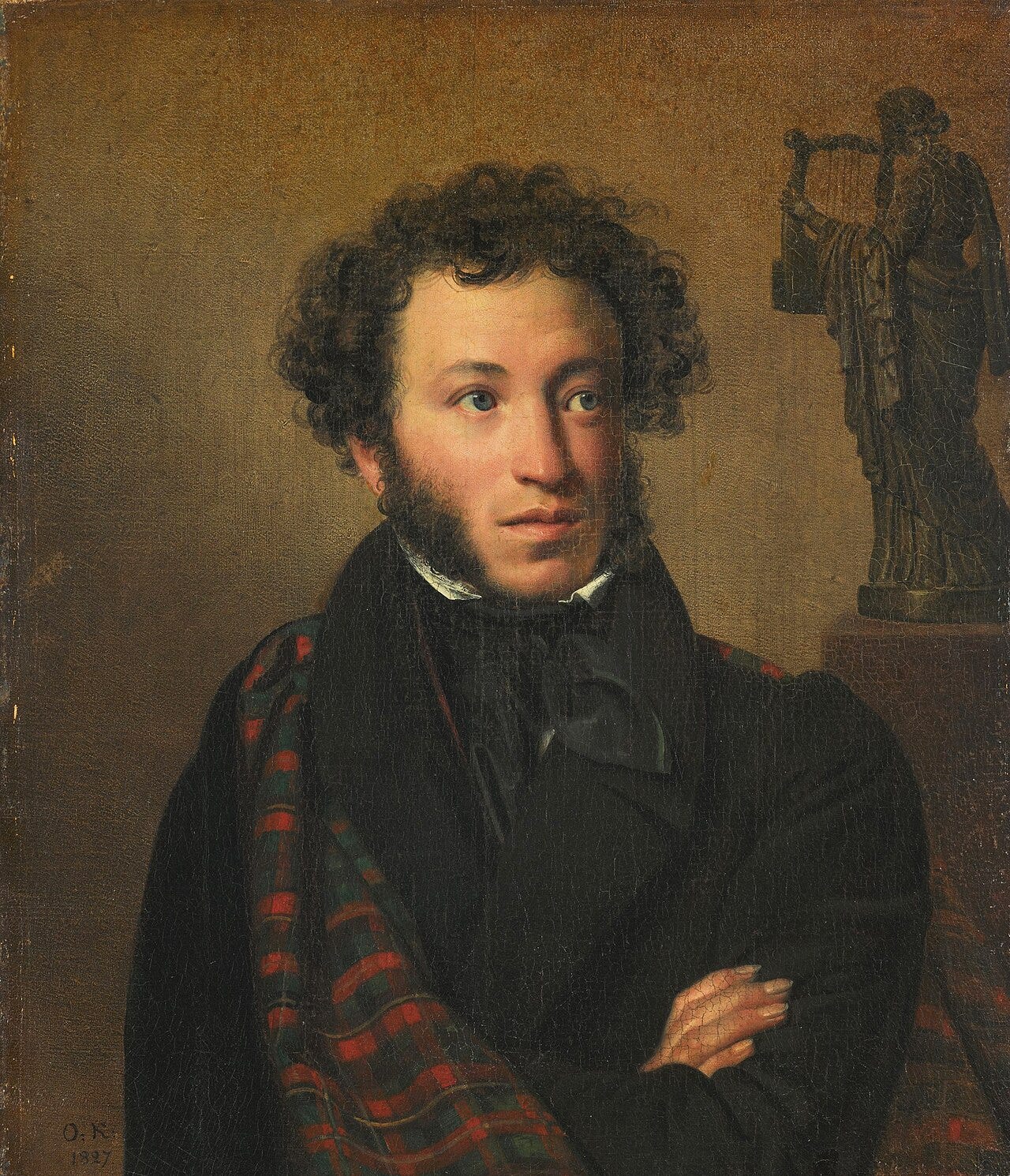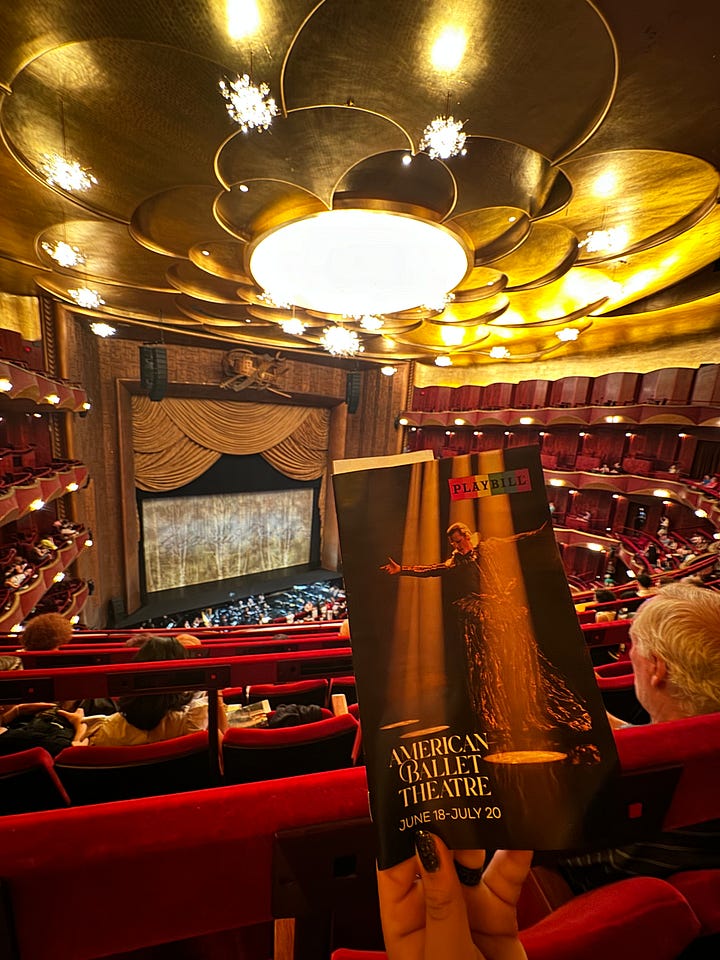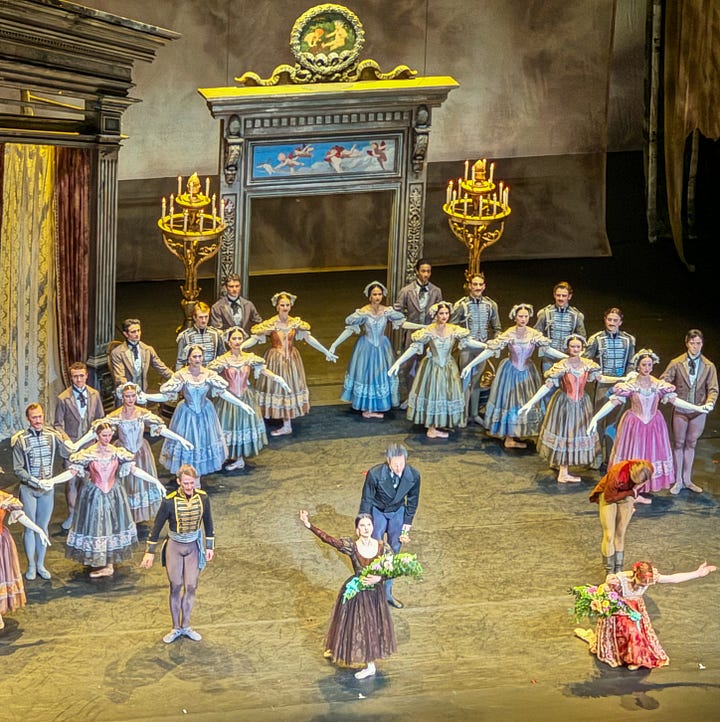Pushkin, Pirouettes, and Purpose
No love letters! Do not challenge me to a duel! I am busy, sweating in New York City, finding my purpose!
Nostalgia and a 93-Degree Day
The most New Yorker way to spend a sizzling summer day
is at the Metropolitan Opera matinee,
enjoying the ABT dance an international ballet.
I may not be Pushkin, though my late grandma used to say that I look like him with my curly wild hair, but I do love rhyming and serendipitous timing.

A 93-degree day is the most effective way for me to feel nostalgic for the motherland. The crisp air! The pine trees! Sweaters instead of chest sweat!
A Night at the Ballet
I didn't have to feel nostalgic this week as I sat at the Met Opera, watching the ABT perform a ballet based on the legendary Pushkin's most famous poem, Onegin, set to music by the renowned Russian composer Tchaikovsky.
My little sister, who has recovered from her Russian Concussion, has been staying with me at my apartment, hiding away from the heat, except to read children's books to kids, do crafts at Museum Mile, and then, when we were gifted free tickets, to try out the ballet too.
Sitting next to my sister, surrounded by Russian whispers, in an air-conditioned beautiful auditorium, I was in the right place at the right time doing the right thing.


Writing about Purpose
Previously, that week, I had some moments when I felt like I was in the wrong place at the wrong time doing the wrong thing. I was hanging out with friends, drinking, dancing. What I was supposed to be doing was writing. Writing about purpose, in fact.
A whole month ago, I put out a survey about purpose because I was feeling reflective about my first 30 years and had a hypothesis about the intersection between purpose and energy. I thought it would be so interesting to ask people in our community their thoughts about purpose! We don’t ask our friends “What is your purpose?” enough.
To me, this question didn't seem weightier than my previous surveys, which asked things like, "What makes a moment feel real?"
Surprisingly, this latest survey caused more anxiety among my friends than my usual ones. Hearing them express this anxiety was contagious, making me too anxious to write about the topic. Perhaps no one needs to read my thoughts about purpose! Maybe they'll expect something very profound! Maybe I'm not valuing purpose enough!
So, I wrote about boys (helpful). I wrote feature requirements (I get paid to do that). I wrote about my heat rash (trust me, it’s gross!). I could not write about purpose.
What alleviated my anxiety and got me writing about purpose again was watching Onegin, a show that I was not purposefully trying to see (because I forgot it was playing and never got tickets). Luckily, I was gifted two tickets. I came into it without context and had the joy of being forced to sit still for two hours and watch a ballet about purpose.
Context is everything.
Ballets have no dialogue, so you gather context from the costumes, the music, and the program. I had never seen Onegin—neither the opera nor the ballet—yet I had more context about the ballet than the usual American girl who stumbled upon it. I am a refugee from Saint Petersburg, where Onegin is set. I have danced ballet. I have read Pushkin. I have played Tchaikovsky.
Watching the ballet was a tug-of-war between all the context I know about Russian literature, ballet, and music, and the story the ballerinas were trying to convey, context aside. On top of that, my age, sex, and culture changed how I viewed the story.
Onegin's Story
The story is about a man, Onegin, who is disillusioned with Russia and his life. He is directionless.
If he took my survey, I'm not sure that it would bring him anxiety, but I do know that he wouldn't know how to answer it, truly.
Onegin has money, smarts, good looks, and all the women he could want.
Enter Tatiana. She just wants to read, write letters, and fall in love with cute men. Relatable!
Tatiana could take my survey and know exactly what to say: life is about love and connection!
They dance around, go on not-dates.
Then, she writes a love letter to Onegin (which everyone should do when in love at least once). And he rejects her (less recommended). Why? She is great! But he is busy! He hasn’t found himself yet! He cannot commit. He is too busy finding his purpose. So, instead of being with her, he flirts with Tatiana’s sister, gets into a duel with his best friend, and becomes a murderer. Shy bookish Tatiana loves that and marries him!
Just kidding!
So, Onegin does what men do best when they make a mistake—disappear entirely!
Then, years later, he reappears when he isn't expected or needed, a skill also possessed by men, and goes to a ball. He is surprised to see Tatiana there, the main character of the ball, elegant, richer than ever, dancing around with some prince she married. Never underestimate a woman who reads and writes!
This is where the ballet and the book land differently, depending on the context of the person watching the ballet. If you know anything about history, you know there were no princes in Russia at that period the poem was written. However, the English ABT program calls the man that Tatiana marries “Prince Gremin.” Gremin was really more of a nobleman but, whatever. The Americans love a fairytale!
If you are a Russian-speaking older lady who knows Pushkin, like me, you know that Tatiana will always love Onegin and is just a heartbroken yet historically and relatably loyal woman, bound by the expectations of her time.
Pushkin’s poem ends with Tatiana saying:
In Russian:
"Я вас люблю (к чему лукавить?),
Но я другому отдана;
Я буду век ему верна."
Translation:
"I love you (why should I deceive?),
But I am given to another;
I will be faithful to him for life."
If you are anyone else, watching the ballet with no context and no dialogue, you see Tatiana at the ball looking very annoyed at her not-ex. Onegin writes her a letter, asking for her love. Tatiana rips it up violently and sends him away!
At this point, the American side of the audience claps, happy for Tatiana. Boy, was I, a New York woman raised in New York and dating in New York, happy for Tatiana. She got rid of that loser and got herself a prince! It is a little too late for letters, buddy.
The Russian-speaking older ladies had a lot to say.
“Do you speak Russian?” they asked me. “Do you know the story? Pushkin must be rolling in his grave! This isn’t a story about Tatiana rejecting an asshole! This is a story about a man searching for his purpose and not getting the girl! You are supposed to empathize for Onegin, not clap for Tatiana!”
The thing about Eastern European women, that I can say because I am one, is that they think their big purpose is complaining.
Pushkin’s Purpose
I clapped at the curtains and left the air-conditioned room, stepping back into the sweaty embrace of New York City.
My sister was yapping about which ballerinas were turning on their left legs.
I was zoning out, thinking about serendipity—how nice it is to unexpectedly watch something that feels so specific to you. I am the perfect person to observe the audience. How fitting, to watch this ballet when I am writing about purpose!
And when it comes to purpose, why would a man who has it all need to search for it? Why do my friends? What good does it do to search for purpose?
In Onegin’s case, he is a Byronic hero who almost dies and doesn’t get the girl! In Pushkin’s case, he was a famous writer who wrote this poem, soon after got into his own duel over a girl, and died too young. For real!
What was Pushkin’s purpose? To write about purpose and to die young, mirroring his sad main character? Did he foresee his own fate in his writing?
Did he read his own poem?
Was Pushkin thinking that it is important to find purpose, that without it, life opportunities and relationships can slip away? Or was he saying that the search for purpose can be distracting from making the right decisions in the moment?
What do I believe about purpose? What will I write? What is my fate?
Three Questions
I thought back to the short story my friends and I read for my birthday book club, by another famous Russian writer. Tolstoy’s Three Questions is similarly about a very rich man—an actual king, even better than a prince—who is searching for purpose.
The directionless king wants to know, “What is the right time, who are the right people, and what is the most important thing to do?”
Unfortunately, he does not have such a great community of survey takers like me 😘! So, he finds a poor person to teach him the answers. Poor people, they are SO interesting. How do they find the will to keep going without all the riches?
The wise man isn’t just any poor person but a hermit.
The hermit says nothing, just spits on his hand, and the king decides to work for the answer. At the end of a very hard work day, the king is tired and still has no answers.
And then the hermit tells him:
“Remember then:
there is only one time that is important – now! It is the most important time because it is the only time when we have any power.
The most necessary person is the one with whom you are, for no man knows whether he will ever have dealings with anyone else; and the most important affair is to do that person good, because for that purpose alone was man sent into this life.”
Remembering this, I focused again on the person most important to me, my sister, who I felt grateful to have right in front of me.
And I smiled. I knew just what to do.
It was time to do some good and help my sister fill out a form for school.
After, it was time to help my family find a yummy place to eat.
Finally, when I was alone and the only person I had to help was myself, it was time to write about purpose.



